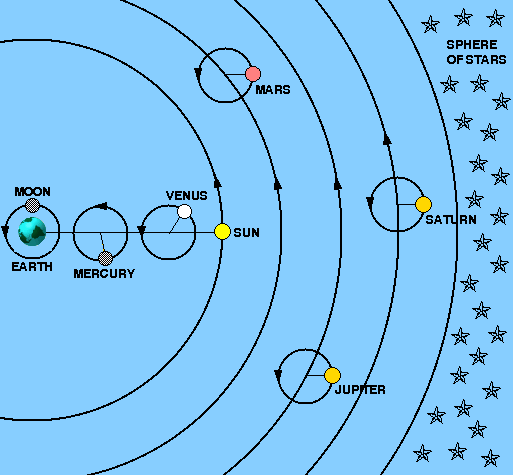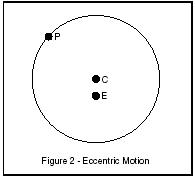I’m fascinated with the historical development of astronomy, but not because I’m some “Trekkie”, whose head is in the clouds. Ok, maybe my head is a little in the clouds, but that’s besides the point. This subject fascinates me for less than obvious reasons.
It’s not so much WHAT people believe but WHY we believe it.
This is an epistemological statement. "I think therefore I am" is an epistemological statement uttered by Emmanuel Kant. Epistemology asks why and how we come to believe in anything. How do we know what we know? How do we come to believe our worldview? It is not so much concerned with WHAT we believe (ontology). This is not to say that what we believe isn't extremely important. But if you get the WHY right, the WHAT is pretty simple.
I see this all illustrated in the historical development of astronomy. In the 2nd century, the majority opinion held to the Ptolemaic model to explain the motions of the celestial bodies. Looking at the above picture, you can see that this view held that the Earth was the center of the universe, with the sun and other planets revolving around it. Notice, that each planet had its own separate rotation. This is called an epicycle and it was added by Ptolemy to explain why planets sometimes appear to wander backwards in the sky.
BTW, for the Ptolemaic model to work, it also had to say that the planets' rotations did NOT center around the Earth, even though it did position the Earth to be in the center of the Universe:
I took the above diagram from http://www.scienceclarified.com/dispute/Vol-2/Historic-Dispute-Is-Earth-the-center-of-the-universe.html, which is an excellent web site to learn more about the historical development of our cosmological models.
The Ptolemaic view also held to the idea that everything in the universe has a perfectly circular orbit. It inherited this from Aristotle, who espoused the Greek notion that the "heavens" had to exhibit motion using only the Greek notions of perfect geometry. Circles are perfect in the Greek mind.
The Ptolemaic view explained the motion of the stars and planets very well. In fact, it explained them so well that it was able to accurately predict their motions. It was the predominant worldview for hundreds of years.
And here is where I get into epistemology. Even though this paradigm was able to successfully forecast the rising of Venus, and make other predictions, even though it was able to be used to map the motions of the celestial bodies, it was dead WRONG.
WHY was it wrong? It wasn't wrong because of faulty logic. The Ptolemaic view is entirely logical. The problem was with its assumptions.
In the 16th century, Copernicus suggested that the Sun was the center of these orbits. This assumption was considered a blasphemy worthy of burning at the stake. In fact, before Copernicus, Giordano Bruno actually suffered this fate for making the same suggestion. A little later in history, after Copernicus, Kepler adopted the Copernican model and strengthened it by throwing out an assumption. He suggested that the celestial bodies did NOT move in perfect circles but that they had elliptical orbits.
This one tweak in assumptions gave the Copernican model strength giving it more accurate predictions than the Ptolemaic model. About a hundred years later, Galileo comes along and brings new technology to the table in the form of a telescope. Using it, he is able to greatly strengthen the Copernican model. The church sentenced him to house arrest as a result.
As an aside, this is why I sometimes say, "I'm not ashamed of Christ but I'm sometimes ashamed at other Christians."
The reason that I'm blogging on this subject is not to teach astronomy or astrophysics. I am no authority in either area. But I guess not being an authority isn't stopping me from blogging on epistemology, so here I go.
Notice that both worldviews were logical and both were useful, but the false worldview could be said to be less useful than the Copernican worldview. Both worldviews could even make predictions but the Copernican worldview ended up being the better of the two.
Also notice that the Copernican view is simpler and yet further beyond our imaginations. It was simpler from a mathematical perspective that I can't attempt to explain, nor would anyone but a mathematician, be interested in reading. The Copernican view stretched the imagination more because it said that WE were in motion around the Sun. It is easier to imagine that every day when man has seen the sun rise and set that IT is moving not the other way around.
Imagination is more important than knowledge. For knowledge is limited to all we now know and understand, while imagination embraces the entire world, and all there ever will be to know and understand. - Albert Einstein
And notice how presuppositions, not logic, was the primary issue. The Ptolemaic model inherited its presuppositions from a Greek philosopher named Eudoxus who espoused that the Earth was the center of the universe. Aristotle adopted Eudoxus' view because it fit into his philosophy. The Ptolemaic view survived and thrived because it worked. It wasn't as accurate as the Copernican view but it worked well enough to be accepted.
You can hold to many worldviews and get some "traction" out of them. Whether or not you are an atheist, theist, agnostic, Christian, Muslim, Jew, Hindu, Buddhist, Sikh, Wiccan, pantheist, animist, pagan, or something else, your worldview probably works in SOME ways. Perhaps your worldview works in MANY ways.
An assumption is the answer to a question unasked.
Question your assumptions. Don't assume because your perspective is rational that it is right. Don't simply engage others in battles over logic. As I continually explore this questioning process, I have found that its path orbits around a cross.







